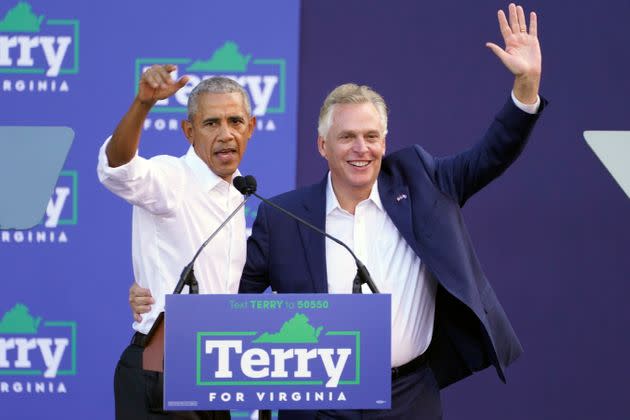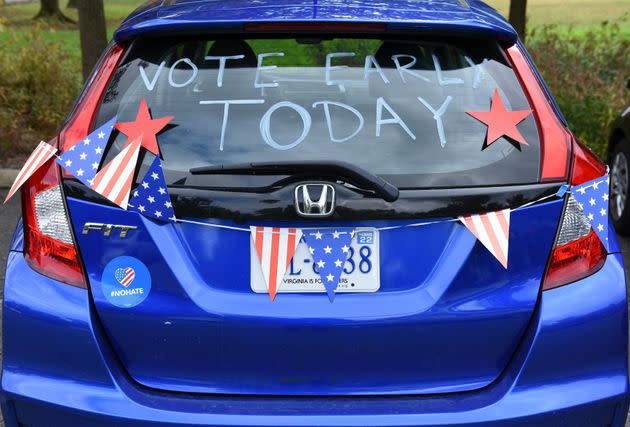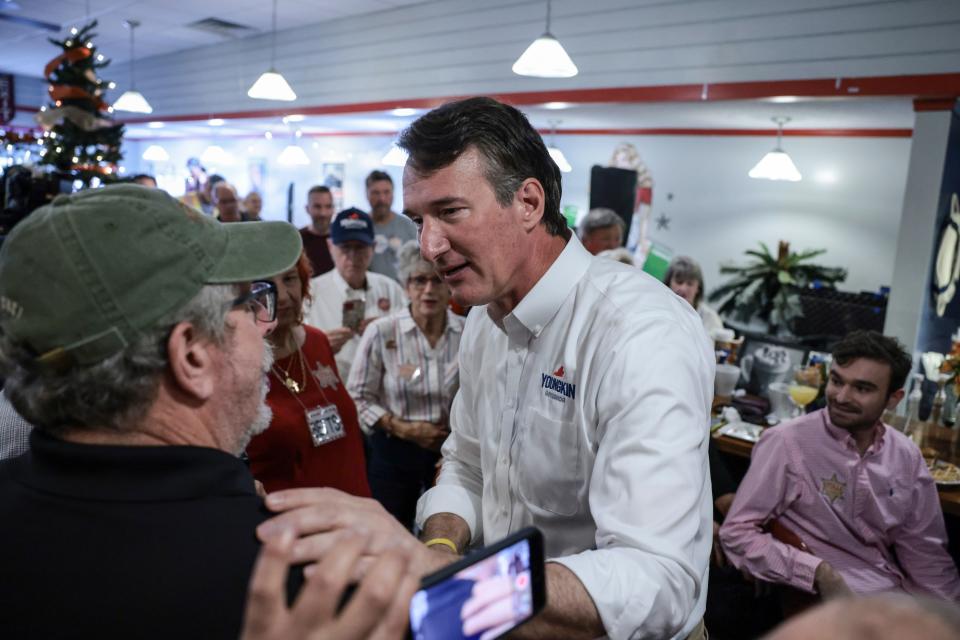Democrats Turn Voting Rights Into A Rallying Cry In Close Virginia Governor’s Race

RICHMOND, Va. ― As Republican state legislatures implemented a wave of new voting restrictions this year, Virginia was one of the few key swing states to go the other way. Democrats who hold majority control of the Virginia General Assembly expanded early and weekend voting, made it easier for voters to cast ballots, and put one of the nation’s most aggressive and explicit voter protection statutes in place.
Now, Virginia Democrats have turned their move to protect and expand voting rights into a rallying cry over the final stretch of this year’s elections, when Virginia voters will elect a new governor, lieutenant governor and attorney general, and determine control of the state House of Delegates.
The Virginia contests, which will conclude next Tuesday, Nov. 2, are one of the first major statewide elections to take place since former President Donald Trump lost the 2020 presidential election. The central role voting rights and election-related conspiracy theories have played in the race has made it a key test of the health of American democracy, as Trump openly defends Jan. 6 rioters and Republicans nationwide have rolled back voting rights.
At recent rallies and campaign events, former Gov. Terry McAuliffe, who is seeking a return to the office he held from 2014 to 2018, has urged Virginians to take advantage of the array of voting options now available to them. The Democratic Party of Virginia and McAuliffe’s campaign have poured millions of dollars into early and absentee voting turnout operations, and organized numerous “Souls to the Polls” events that predominantly Black churches have long used to turn out voters after services in other parts of the country.
Democrats have also used voting rights to draw some of the sharpest contrasts between their candidates and a Republican slate of nominees that has focused heavily on so-called “election integrity” issues, the euphemism GOP lawmakers have used to roll back voting rights in a nationwide push fueled by Trump’s baseless conspiracy theory that last year’s election was stolen from him.
“All across the country, Democrats are trying to make it easier to vote, not make it harder to vote,” former President Barack Obama said at a McAuliffe campaign rally held on Virginia Commonwealth University’s Richmond campus Saturday. Republicans, Obama said, “are trying to systematically prevent ordinary citizens from making their voices heard.”
State lawmakers who spoke at the rally, including Virginia House Speaker Eileen Filler-Corn, touted the new voting laws as one of the legislature’s biggest accomplishments since Democrats regained majority control in 2019. And she and every other Democrat who took the stage painted Democratic victories as necessary to protect those gains from Republicans like Glenn Youngkin, the GOP gubernatorial nominee who has put so-called “election integrity” at the center of his own campaign.
Virginia Republicans have tried to plaster a slightly softer facade on Trumpism in order to make the current, hard right-wing version of the GOP palatable enough to voters even in a state that has trended away from Republicans for a decade and resoundingly rebuked Trump twice.
Youngkin, a former private equity executive who is running in his first election, has attempted to paint himself as a moderate throughout the race. But he has struggled to strike a balance between that pitch and his appeals to conservative Virginians who still adhere to Trump’s lies about the 2020 election.

Youngkin in May said that President Joe Biden legitimately won last year’s race, but only after months spent tiptoeing around the question during a crowded and competitive Republican primary. He has at times refused to correct or refute baseless election-related claims pushed by voters at his campaign events, and has campaigned alongside Virginia Republicans like state Sen. Amanda Chase, who attended the “Stop the Steal” rally that precipitated the Jan. 6 insurrection at the U.S. Capitol. Chase has already spread conspiracies about Democratic attempts to “steal” this year’s election.
She and GOP lieutenant governor candidate Winsome Sears were both featured speakers at a recent rally where attendees pledged allegiance to an American flag that was carried at the Capitol during the insurrection.
Youngkin condemned that episode. But he has said he would push stricter voter ID laws and create an “election integrity task force” as governor, and called election integrity the most important issue of the race ― a statement Democrats have eagerly cited as they try to tie Youngkin to Trump.
During Saturday’s rally in Richmond, Obama hammered Youngkin for attempting to hide his nods to election skeptics behind television ads that have sought to burnish his moderate, everyman credentials by highlighting his high school basketball career at Norfolk Academy and his first job washing dishes at a diner.
“You can’t run ads telling me you’re a regular old hoops-playing, dish-washing, fleece-wearing guy, but quietly cultivate support from those who seek to tear down our democracy,” Obama said. “Either he actually believes in the same conspiracy theories that resulted in a mob, or he doesn’t believe it but he’s willing to go along with it ― to say or do anything to get elected. And maybe that’s worse.”
A Southern Bulwark On Voting Rights
Democrats have steadily enacted democracy reforms in Virginia since McAuliffe won the 2013 gubernatorial race. At the Richmond event Saturday, McAuliffe touted his record of restoring voting rights to more than 173,000 people with prior felony convictions in a state that previously permanently disenfranchised such Virginians.
His successor, Gov. Ralph Northam (D), has restored voting rights to nearly 70,000 more people with felony convictions. Democrats this year passed the Voting Rights Act of Virginia, a law that prohibits the denial of voting rights on the basis of race, color or minority status, requires local election officials to seek state-level preapproval for changes that could disproportionately affect Black Virginians or other racial and ethnic minorities, and allows individual citizens to sue in cases of voter suppression.
Northam and Democrats boast that the law made Virginia the first state to pass a statute to explicitly restore and advance key provisions of the federal Voting Rights Act of 1965, the landmark law that ensured the right to vote for Black Americans but has been gutted by conservative Supreme Court majorities over the last decade.
The assault on voting rights in our country is the ghost of Christmas past in Virginia. The fight right now is to keep it from being the ghost of Christmas future. And Glenn Youngkin is in a starring role as Trump’s acolyte in pushing the Big Lie.Ben Jealous, People for the American Way
Virginia Democrats also passed new laws to expand early and absentee voting and require localities to provide drop boxes where voters can return absentee ballots, changes the state initially implemented to make voting safer during the COVID-19 pandemic last year. November’s election is the first gubernatorial race in which voters have been allowed to cast ballots on Sundays during the early voting period, which began on Sept. 17 and will run through Sunday, Oct. 30.
That has made Virginia “the bulwark, south of the Mason-Dixon line, for protecting voting rights right now,” Ben Jealous, the president of the progressive group People for the American Way, told HuffPost before a get-out-the-vote event in northern Virginia on Sunday.
“The assault on voting rights in our country is the ghost of Christmas past in Virginia,” Jealous said. “The fight right now is to keep it from being the ghost of Christmas future. And Glenn Youngkin is in a starring role as Trump’s acolyte in pushing the Big Lie.”
In addition to the voting rights laws, Virginia Democrats have approved new protections for LGBTQ people, abolished the death penalty and expanded abortion rights in the state. And McAuliffe has pitched voters on new investments into teacher salaries and public education, an increase in the minimum wage to $15, new paid family and sick leave programs, and a litany of other Democratic priorities.
But Youngkin’s refusal to totally refute Trump’s lies ― and his willingness to campaign alongside Republican lawmakers who are still pushing conspiracies about the last election while also generating new ones about the current race — have turned the Virginia gubernatorial election first and foremost into a referendum on the basic idea of democracy, U.S. Sen. Tim Kaine (D-Va.) argued at the Richmond rally.
“This election is about so many things, but the most important thing it’s about is, ‘Can we have a small-d democracy and can everyday people participate?’” Kaine said. “That is what is at stake.”
A Focus On Early Voting
Polls show a close race ahead of the Nov. 2 election, with McAuliffe leading by 1.7 points in FiveThirtyEight’s average of recent surveys. McAuliffe led Youngkin, 50%-45%, in a Data for Progress poll of 1,589 likely voters conducted from Oct. 4-15. That poll also found Democratic nominee Haya Ayala leading the lieutenant governor’s race by 5 points, 47%-42%. It showed Democrats holding a 48%-44% advantage in a generic survey of races for the House of Delegates, where they currently hold a 10-seat majority.
Democrats have won four consecutive presidential contests in Virginia since Obama’s first race in 2008, and they have not lost a statewide election since 2009. But Republicans hope that putting a moderate persona on top of Trumpist policies — in addition to “election integrity,” Youngkin has sought to tap into conservative hysteria over critical race theory throughout the race — can swing the state again. Trump and his adherents, including Chase and former adviser Steve Bannon, have homed in on the race as a key show of strength for the Make America Great Again movement early in the Biden administration.

As polls have tightened in recent weeks, McAuliffe’s campaign has focused on boosting turnout among reliably Democratic constituencies, and especially Black voters, that it fears may be weary from the 2020 election and four years of Trump.
The expanded voting options are central to that strategy: McAuliffe’s campaign and the Democratic Party of Virginia have focused heavily on persuading voters to cast ballots early, and say they have also invested heavily in tracking absentee ballot requests and reaching out to voters to make sure those ballots are returned on time. The campaign has organized a half-dozen Souls to the Polls events, which are possible in Virginia for the first time thanks to the new voting laws’ allowance for Sunday voting.
McAuliffe has visited more than 60 predominantly Black churches across Virginia since early voting began, according to his campaign, which says it has also made five-figure investments into efforts to encourage Latino and Asian American voters to cast ballots early. Democrats in recent weeks enlisted party heavyweights from across the South, including former Georgia state Rep. Stacey Abrams and Atlanta Mayor Keisha Lance Bottoms, to lead early voting rallies and Souls to the Polls events throughout the state. Biden and Vice President Kamala Harris will both campaign for Democrats in Virginia over the final week of the race.
On weekdays, people are working 9 to 5, sometimes they have to take off work to go vote. So having this on weekends, Saturdays and Sundays, it’s great. That’s how you show you’re a democracy, you get people out to vote.Everett Lewis, Virginia voter
The McAuliffe campaign held four Souls to the Poll events Sunday, on the penultimate weekend of early voting. In Alexandria, a suburb of Washington D.C., more than 50 people gathered outside St. Joseph’s Church for a short rally with Democratic lawmakers before marching to a nearby polling place to cast ballots. At least three other Alexandria churches held voting-related events alongside the official Souls to the Polls rally, said Kevin Harris, one of the event’s organizers.
“The whole point of this is to raise awareness, so people will know they have a Sunday accessible to them to get out and vote,” Harris said. “They see the things that are happening all over the country, how people are trying to restrict their opportunity to vote. But voting shouldn’t be a hard thing. It shouldn’t be a thing where I have to rearrange my whole schedule to vote. It should be something that is there and available.”
Some attendees, like Alexandria resident Everett Lewis, had already taken advantage of early voting but showed up to encourage others to head to the polls after the rally. Lewis, 74, has voted early in prior elections, but was happy to see Virginia further expand the number of options available to a broader swath of voters before this year’s election.
“On weekdays, people are working 9 to 5, sometimes they have to take off work to go vote,” Lewis said. “So having this on weekends, Saturdays and Sundays, it’s great. That’s how you show you’re a democracy, you get people out to vote.”
Others were excited to vote as part of a Souls to the Polls rally, given the debut of the sort of events that Black churches have used to turn out voters since the civil rights movement. Harris estimated that at least 75 voters cast ballots after attending the Alexandria events.
“Some people don’t take [voting] as seriously as they should, because they don’t think they can make a difference,” said Ryan Jackson, who voted for McAuliffe on Sunday after attending the event. “But I believe I can, and always want to encourage other people to believe the same thing. This encourages people to get out and do it.”
‘It Means Our Democracy Is Stronger’
Unlike Trump, whose efforts to minimize the pandemic and discredit early and absentee voting gave Democrats a heavy turnout advantage among those who chose to cast ballots before Election Day, Youngkin’s campaign has also prioritized early voting. This past weekend, Youngkin held early vote rallies outside of Richmond and in several cities in southeast Virginia, a key area of the state for both candidates.
Youngkin’s campaign did not respond to requests for comment on its early voting and turnout efforts, although it told the New York Times that more than 100 people voted early after one recent event. In response to past claims about Youngkin’s stance on election integrity issues, the campaign has pointed to previous statements McAuliffe has made about the legitimacy of the 2000 election between George W. Bush and Al Gore.
Overall, more than 724,000 Virginians had voted early as of Sunday, less than the number who cast early ballots in 2020 but six times more than had done so by this point in the 2017 election, according to the Virginia Public Access Project.
Neither comparison offers much of a lens into overall turnout, given that 2020 was a presidential race and early voting was not as widely available in the last gubernatorial cycle. But Democrats say they expect total turnout to exceed 2017, when higher-than-expected participation rates and opposition to Trump helped Northam outpace late polls and win the governor’s race by 9 points.
Outside Alexandria’s early voting precinct on Sunday, state House Majority Leader Charniele Herring (D) celebrated that both campaigns have made early voting a priority, even if she remains concerned that Republicans will seek to roll back voting rights if Youngkin wins and the GOP regains control of the state legislature.
The point of the new laws, she said, isn’t to boost Democrats, as many Republicans have alleged, but to make it easier for all Virginians to participate in elections.
“I am glad that both parties are out there promoting early voting,” Herring said. “Because it means more participation, and it means our democracy is stronger.”
This article originally appeared on HuffPost and has been updated.

 Yahoo Finance
Yahoo Finance 


